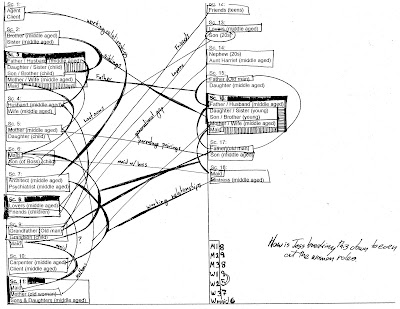
Do critics go straight home?
Do they stop at a bar first? Lube the synapses?
Do they go out with people and talk about the play to confirm their own suspicions, or do they shelter their precious opinions away from the ruckus, the hubbub of chittering little theatre birds who like too much and too often?
How quickly do they process? Do they know the moment the applause stops whether they are moved, whether they will be moved tomorrow afternoon on their drive home from their editor's office? Or do they let it all sink in; marinate?
Seven wine glasses with some cheap cheap red sit on the unused tablecloth covering a thoroughly used table. The stage empties, and the actors are gone. The lights quickly dim, and the glasses are gone too. This moment has been a long time coming; it has been earned, as they say in the biz. But it is over too quickly. The actors speed off. And the wine in the glass has barely settled before the room's gone dark. We want it back.
"This is not a play about dishes, or food, or costume changes, but rather a play about people in a dining room" -- A. R. Gurney, Jr. Preface
Jess in her genius -- or the genius of her artistic team, she will tell you -- simply get rid herself of the dishes and the food. No newspapers. No tea-cups or birthday cakes. But through the soundscape, there they were. Perfectly timed movements to perfectly simple sounds: the snap and shuffle of the morning news, the clinking of china. The groundlings would say, on their commute through the plague-ridden streets, "we are going to hear a play."
Nothing throughout the show, save a table and chairs. No props to lean on or hid behind.
And then these glorious glasses with shining wine. In the final scene, the materialization of a dream: the simplest dream of reality. But so quickly gone. I want them back. Wait. Please. Just a little longer. Hold that cue...
But maybe that is the point: the vignettes of The Dining Room are -- if not straight memory scenes -- always nostalgic. Always about longing. Always about the past. A past we can never get more of. The sands in an hourglass slipping through. The last glance at a wine glass before the rose fades to gray fades to darkness.
I wonder if critics feel regret? Do they think of their reviews like referees think of calls? Snap judgments under pressure; under a deadline? Do they ever go back and look at the feed and say, wow, I really fucked that up. I should have stopped at a bar on my way home.
I hug Jess on the way out of the theatre. I think about mentioning the wine glasses. I wanted more of them, Jess. Just three more seconds alone with that image. Please? But I didn't say that. I'm glad I didn't. I'm glad I let it marinate.
Well, Jess. I wish you happy reviews, well-deserved. I smiled at a stranger walking her dog on the walk home from the bus, and for some reason I know it's your fault.


No comments:
Post a Comment